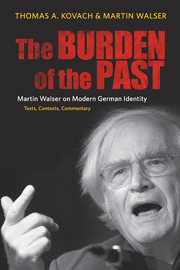Book contents
- Frontmatter
- Contents
- Acknowledgments
- The Burden of the Past
- Introduction
- Our Auschwitz (1965)
- No End to Auschwitz (1979)
- Handshake with Ghosts (1979)
- Speaking of Germany (A Report) (1988)
- Experiences while Composing a Sunday Speech: The Peace Prize Speech (1998)
- On Talking to Yourself: A Flagrant Attempt (2000)
- Conclusion
- Suggestions for Further Reading
- Index
Conclusion
Published online by Cambridge University Press: 05 February 2013
- Frontmatter
- Contents
- Acknowledgments
- The Burden of the Past
- Introduction
- Our Auschwitz (1965)
- No End to Auschwitz (1979)
- Handshake with Ghosts (1979)
- Speaking of Germany (A Report) (1988)
- Experiences while Composing a Sunday Speech: The Peace Prize Speech (1998)
- On Talking to Yourself: A Flagrant Attempt (2000)
- Conclusion
- Suggestions for Further Reading
- Index
Summary
IN 2002, FOUR YEARS AFTER the Peace Prize speech, Walser published his novel Tod eines Kritikers (Death of a Critic), which featured a corrupt and power-hungry literary critic and media celebrity named André Ehrl-König, who “happens to be” Jewish. Anyone familiar with the German literary scene would recognize Ehrl-König as a caricature of Marcel Reich-Ranicki. Even before the novel's appearance, it unleashed a scandal almost equal to the one following his 1998 speech: Frank Schirrmacher, the literary editor and co-publisher of the FAZ, who gave the introductory tribute to Walser prior to his speech in St. Paul's Church, and who was to defend him following the speech, announced in an open letter to Walser that he regarded the novel as a “document of hate” riddled with antisemitic clichés, and that therefore, contrary to their established procedure, there would be no advance publication of the novel in FAZ. The fact that one of Walser's prominent defenders now seemed to agree with his attackers not only reopened the wounds that had scarcely begun to heal from the Peace Prize debate, but in the eyes of many settled the issue once and for all — Walser had been found guilty of pursuing an antisemitic agenda. But even though few would claim that it was among Walser's better novels, many did defend it as fundamentally a satire and critique of the excessive power wielded by the mass media in the German literary industry.
- Type
- Chapter
- Information
- The Burden of the PastMartin Walser on Modern German Identity: Texts, Contexts, Commentary, pp. 129 - 134Publisher: Boydell & BrewerPrint publication year: 2008



